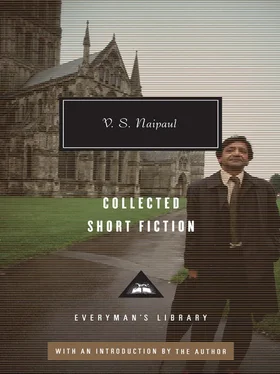1962
I WALKED up the back stairs into the veranda, white in the afternoon sun. I could never bring myself to enter that house by the front stairs. We were poor relations; we had been taught to respect the house and the family.
On the right of the veranda was the kitchen, tiled and spruce and with every modern gadget. An ugly Indian girl with a pockmarked face and slack breasts was washing some dishes. She wore a dirty red print frock.
When she saw me she said, ‘Hello, Romesh.’ She had opened brightly but ended on a subdued tone that was more suitable.
‘Hello,’ I said softly. ‘Is she there?’ I jerked my thumb towards the drawing-room that lay straight ahead.
‘Yes. Boy, she cries all day. And the baby was so cute too.’ The servant girl was adapting herself to the language of the house.
‘Can I go in now?’
‘Yes,’ she whispered. Drying her hands on her frock, she led the way. Her kitchen was clean and pure, but all the impurities seemed to have stuck on her. She tiptoed to the jalousied door, opened it an inch or two, peered in deferentially and said in a louder voice, ‘Romesh here, Miss Sheila.’
There was a sigh inside. The girl opened the door and shut it behind me. The curtains had been drawn all around. The room was full of a hot darkness smelling of ammonia and oil. Through the ventilation slits some light came into the room, enough to make Sheila distinct. She was in a loose lemon housecoat; she half sat, half reclined on a pink sofa.
I walked across the polished floor as slowly and silently as I could. I shifted my eyes from Sheila to the table next to the sofa. I didn’t know how to begin.
It was Sheila who broke the silence. She looked me up and down in the half-light and said, ‘My, Romesh, you are growing up.’ She smiled with tears in her eyes. ‘How are you? And your mother?’
Sheila didn’t like my mother. ‘They’re all well — all at home are well,’ I said. ‘And how are you?’
She managed a little laugh. ‘Still living . Pull up a chair. No, no — not yet. Let me look at you. My, you are getting to be a handsome young man.’
I pulled up a chair and sat down. I sat with my legs wide apart at first. But this struck me as being irreverent and too casual. So I put my knees together and let my hands rest loosely on them. I sat upright. Then I looked at Sheila. She smiled.
Then she began to cry. She reached for the damp handkerchief on the table. I got up and asked whether she would like the smelling salts or the bay rum. Jerking with sobs, she shook her head and told me, in words truncated by tears, to sit down.
I sat still, not knowing what to do.
With the handkerchief she wiped her eyes, pulled out a larger handkerchief from her housecoat and blew her nose. Then she smiled. ‘You must forgive me for breaking down like this,’ she said.
I was going to say, ‘That’s all right,’ but the words felt too free. So I opened my mouth and made an unintelligible noise.
‘You never knew my son, Romesh?’
‘I only saw him once,’ I lied; and instantly regretted the lie. Suppose she asked me where I had seen him or when I had seen him. In fact, I never knew that Sheila’s baby was a boy until he died and the news spread.
But she wasn’t going to examine me. ‘I have some pictures of him.’ She called in a gentle, strained voice: ‘Soomintra.’
The servant girl opened the door. ‘You want something, Miss Sheila?’
‘Yes, Soomin,’ Sheila said (and I noticed that she had shortened the girl’s name, a thing that was ordinarily not done). ‘Yes, I want the snapshots of Ravi.’ At the name she almost burst into tears, but flung her head back at the last moment and smiled.
When Soomintra left the room I looked at the walls. In the dim light I could make out an engraving of the Princes in the Tower, a print of a stream lazing bluely beautiful through banks cushioned with flowers. I was looking at the walls to escape looking at Sheila. But her eyes followed mine and rested on the Princes in the Tower.
‘You know the story?’ she asked.
‘Yes.’
Look at them. They’re going to be killed, you know. It’s only in the past two days I’ve really got to understand that picture, you know. The boys. So sad. And look at the dog. Not understanding a thing. Just wanting to get out.’
‘It is a sad picture.’
She brushed a tear from her eye and smiled once more. ‘But tell me, Romesh, how are you getting on with your studies?’
‘As usual.’
‘Are you going away?’
‘If I do well in the exams.’
‘But you’re bound to do well. After all, your father is no fool.’
It seemed overbearingly selfish to continue listening. I said, ‘You needn’t talk, if you don’t want to.’
Soomintra brought the snapshot album. It was an expensive album, covered in leather. Ravi had been constantly photographed from the time he had been allowed into the open air to the month before his death. There were pictures of him in bathing costume, digging sand on the east coast, the north coast and the south coast; pictures of Ravi dressed up for Carnival, dressed up for tea parties; Ravi on tricycles, Ravi in motor cars, real ones and toy ones; Ravi in the company of scores of people I didn’t know. I turned the At last we exhausted the snapshots. Sheila had grown silent towards the end. I felt she had been through the album many times in the past two days.
I tapped my hands on my knees. I looked at the clock on the wall and the Princes in the Tower. Sheila came to the rescue. ‘I am sure you are hungry.’
I shook my head faintly.
‘Soomin will fix something for you.’
Soomintra did prepare something for me, and I ate in the kitchen — their food was always good. I prepared to face the farewell tears and smiles. But just then the Doctor came. He was Sheila’s husband and everyone knew him as ‘The Doctor’. He was tall with a pale handsome face that now looked drawn and tired.
‘Hello, Romesh.’
‘Hello, Doctor.’
‘How is she?’
‘Not very happy.’
‘She’ll be all right in a couple of days. The shock, you know. And she’s a very delicate girl.’
‘I hope she gets over it soon.’
He smiled and patted me on the shoulder. He pulled the blinds to shut out the sun from the veranda, and made me sit down.
‘You knew my son?’
‘Only slightly.’
‘He was a fine child. We wanted — or rather, I wanted — to enter him in the Cow and Gate Baby Contest. But Sheila didn’t care for the idea.’
I could find nothing to say.
‘When he was four he used to sing, you know. All sorts of songs. In English and Hindi. You know that song — I’ll Be Seeing You ?’
I nodded.
‘He used to sing that through and through. He had picked up all the words. Where from I don’t know, but he’d picked them up. And even now I don’t know half the words myself. He was like that. Quick. And do you know the last words he said to me were “I’ll be seeing you in all the old familiar places”? When Sheila heard that he was dead she looked at me and began to cry. “I’ll be seeing you,” she said.’
I didn’t look at him.
‘It makes you think, doesn’t it? Makes you think about life. Here today. Gone tomorrow. It makes you think about life and death, doesn’t it? But here I go, philosophizing again. Why don’t you start giving lessons to children?’ he asked me abruptly. ‘You could make tons of money that way. I know a boy who’s making fifty dollars a month by giving lessons one afternoon a week.’
‘I am busy with my exams.’
He paid no attention. ‘Tell me, have you seen the pictures we took of Ravi last Carnival?’
Читать дальше









